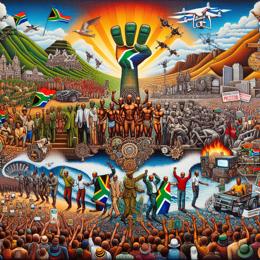Picture: for illustration purposes
Imraan Buccus Cautions on Press Freedom Risks in New Cold War
In a recent op-ed, Imraan Buccus, senior research associate at Auwal Socioeconomic Research Institute and a postdoctoral fellow at Durban University of Technology, issued an assertive warning about the potential hazards to freedom of the press amid an emerging new Cold War.
Buccus underscores the importance of a free press for the existence of a democratic society but laments that geopolitical biases often skew global understanding and defence of press freedoms. His concern is that governments globally are more concerned about clamping down on critical journalism, particularly countries like Russia, China and Zimbabwe who have been notoriously known for such actions; whereas, the same countries that criticize these nations exhibit similar actions at home and among their allies.
He cites the recent raid on more than 100 journalists' homes in India as an example of how press freedom within Western ally countries often goes underreported or unchallenged. These journalists, including two senior colleagues, continue to languish in custody with little attention from Western media outlets.
Buccus further comments on how the ongoing Israel-Hamas conflict has significantly affected journalists. He quotes an estimate by UNESCO, highlighting the “deadliest week for journalists in any recent conflict”, with nine confirmed journalist deaths. Furthermore, he elaborated on the distressing case of the female head of Palestinian Media Assembly's Women Journalists Committee, whose family was also killed along with her during a strike in northern Gaza.
Of urgent necessity, Buccus implores the international community to provide protection in conflict zones similar to what is accorded to organizations like the Red Cross. He emphasizes the need for credible information during conflicted times, stating that the propensity for “fake news”, or war propaganda, increases, and this makes the need for reliable journalists in the battle scene even more acute.
Buccus suggests that while the UN and individual journalists' organizations have made significant strides, none seem robust enough to tackle the daunting challenges faced by global media. He concludes by calling for an independent, global union of journalists with a clear charter of principles to effectively safeguard press freedom, regardless of geopolitical considerations.



